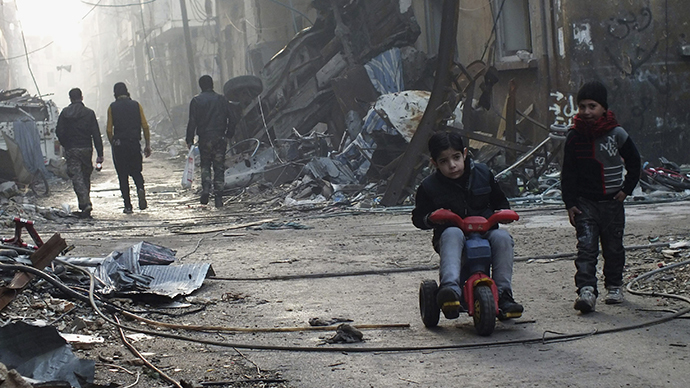US Congress Secretly Approves Sending Small Arms to ‘Moderate’ Syrian Rebels

Congressional lawmakers have quietly authorized sending small arms, an assorted variety of rockets, and financial backing to so-called “moderate” rebels fighting in Syria’s civil war, according to a new report.
American and European security officials told Reuters that the US will provide anti-tank rockets, but nothing as deadly as shoulder-launched surface-to-air missiles (known as MANPADs), which can be used to bring down military or civilian aircraft.
Legislators voted in closed-door meetings to fund the opposition forces through September 30, the end of the US government’s fiscal year. The decision is an about-face from congressional debates last year, in which the same committees were reluctant to supply arms over concerns that American weapons would wind up in the hands of radical Islamists fighting in the region, the Al-Qaeda-backed Al-Nusra being the most well known.

Now, though, those concerns appear to have lessened. Exactly when Congress approved the funding is not known, yet the sources speculated that it was signed in a classified section of a defense appropriations bill that was approved in December.
“The Syrian war is a stalemate,” said Bruce Riedel, a former CIA analyst and current foreign policy advisor to US President Obama with the Brookings Institution. “The rebels lack the organization and weapons to defeat Assad; the regime lacks to loyal manpower to suppress the rebellion. Both sides’ external allies…are ready to supply enough money and arms to fuel the stalemate for the foreseeable future.”

Despite the uncertainty remaining around the conflict, Western officials have asserted in recent weeks that “moderate” rebels have strengthened their positions in the south of Syria and have begun excluding Al-Qaeda sympathizers. Extremists are known to be in control of rebel forces in the north and east, however.
US and British officials temporarily suspended “non-lethal aid” (a category that includes communications equipment and transportation vehicles) in December, although officials now say they hope to resume providing assistance to the Supreme Military Council (SMC), which oversees rebel forces favored by the West.
“We hope to be able to resume assistance to the SMC shortly, pending security and logistics considerations,” one source told Reuters. “But we have no announcement at this time.”
News of the funding comes as the Syrian government and the external opposition in Geneva have reached an agreement that would see humanitarian aid enter the besieged city of Homs, and would allow women and children to leave its war-ravaged areas.
What makes the deal dubious, however, is that it’s not yet clear how it will be implemented on the ground. Currently, the Syrian government is promising – voiced on Sunday by Deputy Foreign Minister Faisal Mekdad – that women and children can leave Homs safely. Another question is how rebels inside the city besieged by the army will react.
“If the armed terrorists in Homs allow women and children to leave the old city of Homs, we will allow them every access. Not only that, we will provide them with shelter, medicines and all that is needed,” he said, as cited by Reuters. “We are ready to allow any humanitarian aid to enter into the city through the arrangements made with the UN.”
US State Department spokesman Edgar Vasquez said that an evacuation is not a legitimate option because of how dire the need for aid is.
“We firmly believe that the Syrian regime must approve the convoys to deliver badly needed humanitarian assistance into the Old City of Homs now,” Vasquez said. “The situation is desperate and the people are starving.”
The results of a meeting in Geneva, Switzerland – where government officials sat across the negotiating table from representatives of the opposition on Monday – is so far unclear. Each side pledged its willingness to continue discussions, though progress so far has been nearly nonexistent.
United Nations envoy Lakhdar Brahimi told reporters after the meeting Monday that even though the talks “haven’t produced much,” another session was scheduled for Tuesday.
“Once again, I tell you we never expected any miracle, there are no miracles here,” he said in a news conference. “My expectation from this conference is that the unjust war will stop. But I know this is not going to happen today or tomorrow or next week.”

